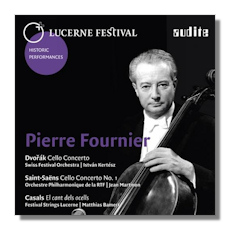
The Internet's Premier Classical Music Source
Related Links
-
Dvořák Reviews
Saint-Saëns Reviews - Latest Reviews
- More Reviews
-
By Composer
-
Collections
DVD & Blu-ray
Books
Concert Reviews
Articles/Interviews
Software
Audio
Search Amazon
Recommended Links
Site News
 CD Review
CD Review
Lucerne Festival

- Antonín Dvořák: Cello Concerto in B minor, Op. 104 *
- Camille Saint-Saëns: Cello Concerto #1 in A minor, Op. 33 **
- Pablo Casals: El cant del ocells ***
Pierre Fournier, cello
* Swiss Festival Orchestra/István Kertész
** RTF Philharmonic Orchestra/Jean Martinon
*** Lucerne Festival Strings/Matthias Bamert
Audite 95.628
This is yet another valuable disc from the archives of the Lucerne Festival, and this time the program focuses on the great Pierre Fournier. Let me say off the bat that I feel the studio versions are preferable, on both sonic – and to a lesser extent – artistic grounds. That said, this is a disc that pays tribute to not only Fournier, but also the conductors with whom he collaborates.
Had he lived long enough, Kertész would certainly have made a recording of the Dvořák Cello Concerto under studio conditions, likely in London. That was unable to occur, and so this live reading with Fournier from 1967 is well-worth hearing. I am not entirely convinced by the leadership from the podium, which features absurdly forward brass playing that leaps from the textures. There are other things that might also raise an eyebrow; why does the conductor smear the final chord of the first movement? It sounds ugly. Fournier recorded the work with George Szell in that conductor's only studio recording with the Berlin Philharmonic. That Deutsche Grammophon take finds the cellist in a slightly less freewheeling mood, but also paired with a superior orchestra. Even under great leadership, the Swiss Festival Orchestra was never anything too special. Still, lest you believe me to hate this performance, I don't. Fournier was a master, and there is much to enjoy here.
Fournier and Martinon recorded the Saint-Saëns under studio conditions for Deutsche Grammophon in 1960. Two years later, they collaborated for this 1962 live reading at Lucerne. To my ears, both are extremely fine performances. Both the RTF Philharmonic heard here are the Lamoureux Orchestra on DG were generally second-rate bands that could make amazing sounds under Markevitch, Paray, and Martinon. All three are vastly underrated, but Martinon's obscurity is the greatest shame because he'd be a star today in Chicago, where he was run out of town by bad press. His work there and in France is uniformly superb, and his Saint-Saëns is legendary. I prefer the studio version for its slightly tidier execution and finer sound, but this is a performance that I'm glad to have heard. The Casals (with spoken introduction) serves as a touching encore and a memento of Fournier's final Lucerne appearance.
The question of necessity is obviously one worth asking. Both major works receive classic recordings on Deutsche Grammophon; neither rendition here quite surpasses the studio takes. Kertész fans may want this to flesh out the conductor's distinguished Dvořák discography. Anything from Martinon is also welcome, so tasteful and intelligent was his art. And of course, Fournier was one of the finest cellists of his generation, or any for that matter. Audite deserves nothing but praise for this Lucerne series, but I can't help but think that this particular disc has limited appeal.
Copyright © 2015, Brian Wigman





















